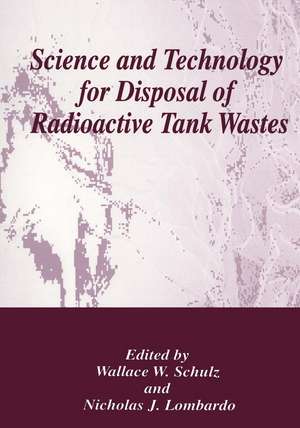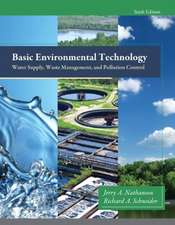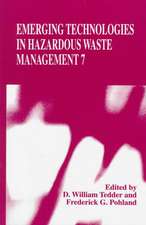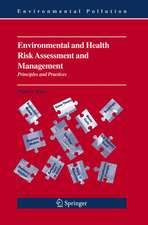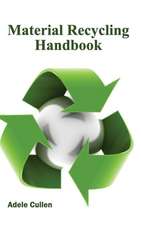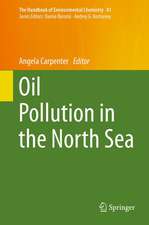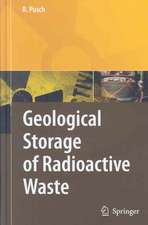Science and Technology for Disposal of Radioactive Tank Wastes
Editat de Wallace W. Shulz, Nicholas J. Lombardoen Limba Engleză Paperback – 25 iun 2013
| Toate formatele și edițiile | Preț | Express |
|---|---|---|
| Paperback (1) | 1234.62 lei 6-8 săpt. | |
| Springer Us – 25 iun 2013 | 1234.62 lei 6-8 săpt. | |
| Hardback (1) | 1242.66 lei 6-8 săpt. | |
| Springer Us – 30 aug 1998 | 1242.66 lei 6-8 săpt. |
Preț: 1234.62 lei
Preț vechi: 1505.64 lei
-18% Nou
Puncte Express: 1852
Preț estimativ în valută:
236.23€ • 246.68$ • 195.08£
236.23€ • 246.68$ • 195.08£
Carte tipărită la comandă
Livrare economică 15-29 aprilie
Preluare comenzi: 021 569.72.76
Specificații
ISBN-13: 9781489915450
ISBN-10: 1489915451
Pagini: 544
Ilustrații: XIV, 526 p.
Dimensiuni: 178 x 254 x 29 mm
Greutate: 0.93 kg
Ediția:1998
Editura: Springer Us
Colecția Springer
Locul publicării:New York, NY, United States
ISBN-10: 1489915451
Pagini: 544
Ilustrații: XIV, 526 p.
Dimensiuni: 178 x 254 x 29 mm
Greutate: 0.93 kg
Ediția:1998
Editura: Springer Us
Colecția Springer
Locul publicării:New York, NY, United States
Public țintă
ResearchDescriere
Radioactive wastes resulting from over 40 years of production of nuclear weapons in the U. S. are currently stored in 273 underground tanks at the U. S. Department of Energy Hanford site, Idaho National Engineering and Environmental Laboratory, Oak Ridge Reservation, and Savannah River site. Combined, tanks at these sjtes contain approximately 94,000,000 gallons of waste in a variety of forms including liquid, concrete-like salt cake, and various sludges. More than 730,000,000 curies of several radioactive isotopes are present in the underground tanks. Certainly, one of the greatest challenges facing the U. S. Department of Energy is how to characterize, retrieve, treat, and immobilize the great variety of tank wastes in a safe, timely, and cost-effective manner. For several years now, the U. S. Department of Energy has initiated and sponsored scientific and engineering studies, tests, and demonstrations to develop the myriad of technologies required to dispose of the radioactive tank wastes. In recent times, much of the Department of Energy R&D activities concerning tank wastes have been closely coordinated and organized through the Tanks Focus Area (IF A); responsibility for technical operations of the TF A has been assigned to the Pacific Northwest National Laboratory.
Cuprins
Disposal Strategies and Technology Needs: Overview of U.S. Radioactive Tank Problem; T.L. Stewart, et al. Science Needs for Tank Waste Remediation; J.P. LaFemina. Tanks Focus Area: Technology Program to Meet DOE's Tank Waste Clean-Up Needs; T.M. Brouns, et al. Characterization and Retrieval: Comparisons of Historical Process Estimates with Tank Waste Assays; S.F. Agnew. A Risk and Outcome Based Strategy for Justifying Characterization to Resolve Tank Waste Safety Issues; S.D. Colson, et al. Tank Waste Pretreatment Processes: Solids Control in Sludge Pretreatment; E.C. Beahm et al. Enhanced Sludge Washing for Pretreating Hanford Tank Sludges; G.J. Lumetta, et al. Tank Waste Immobilization Processes and Experience: Startup of Savannah River's Defense Waste Processing Facility to Produce Radioactive Glass; W.M. Bennett, H.H. Elder. Grout and Vitrification Formula Development for Immobilization of Hazardous Radioactive Tank Sludges at ORNL; T.M. Gilliam, R.D. Spence. Process Control and Monitoring Technology: Detecting 137Cs Breakthrough in an Ion Exchange Process; R.L. Brodzinski, et al. Comparative Testing of Slurry Monitors; T.D. Hylton, et al. 29 Additional Articles. Index.
